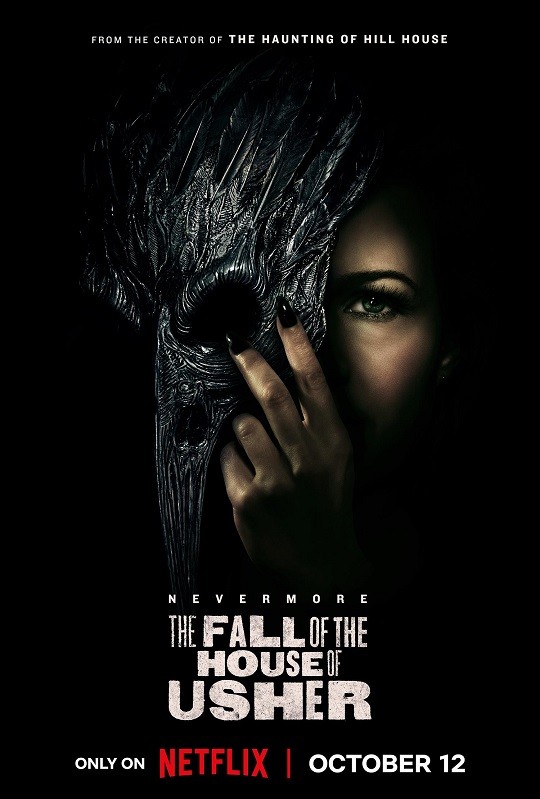The Fall Of The House Of Usher
Introduction
Mike Flanagan is back, and how! The master of horror series has bounced back after the middling Midnight Mass and The Midnight Club, with The Fall Of The House Of Usher, Netflix’s annual Halloween offering for this year. And does so in style. The Fall Of The House Of Usher is grounded, realistic, philosophical, thought-provoking, socially aware, and above all, haunting. It’s a social commentary against capitalism, hidden under layers of supernatural horror. I know it sounds like a lot, but trust me, it delivers, and then some.
I have been a fan of Flanagan since The Haunting Of Hill House (2018), which is in my top 5 series of all time, across genres (yes, it’s that good). And while his subsequent series for Netflix could not reach the dizzying heights of Hill House, they were still good to watch, especially for horror buffs. But with The Fall Of The House Of Usher, Flanagan makes a sweeping statement about his grim view of humanity. That it is an adaptation of Edgar Allan Poe’s macabre short story of the same name, makes it even more commendable. So what is it that makes The Fall Of The House Of Usher so great? Read on to find out.
Story & Screenplay
The Fall Of The House Of Usher revolves around the Usher family, which has made billions by selling a controversial drug since the 1980s, one that is highly addictive and has indirectly led to the death of millions of people over the years. Despite multiple cases against them, the Usher family seems to almost magically wriggle out of legal hassles.
Led by the patriarch Roderick Usher and his genius sister Madeline Usher (a supreme Mary McDonnell), the Usher family is filled with a myriad of mercurial characters. There’s his eldest son Frederick and daughter Tamerlane (‘Tammy’), his two legitimate children with his first wife Annabel Lee. And then he has four illegitimate children – Victorine, Camille, Napolean, and Prospero. Against the backdrop of a litigation against their company led by Auguste Dupin, the kids of the family start dying one by one, in the most mysterious and brutal fashions.
Baffled by what is happening to their family, Roderick and Madeline enlist the help of Arthur Pym, their long-time attorney and fixer. Pym finds the common link between all these freak ‘accidents’ – a mysterious woman. Who exactly is this woman? What are her motives? Will the Usher family be able to save themselves? How exactly did Roderick and Madeline rise to such power in the first place? All of these questions form the crux of the story.
The screenplay by Flanagan, along with his usual associates Rebecca Klingel, Justina Ireland, and Kiele Sanchez is spellbinding. We are thrust into the middle of the action straight away, with some of the deaths already having taken place. And it was a genius move to unravel the entire story from Roderick’s perspective, as he narrates everything to Dupin. Not only does it give us an insight into the evil mind of Roderick, but also brings forth the element of an unreliable narrator. We keep doubting whether Roderick’s retelling of events really happened or was all in his head. It’s a delicate balance to create and the writers achieve it with some flair.
All the characters get ample time and moments to shine on their own. Much like Hill House, they have their own backstories, which very beautifully tie into WHY those characters are the way they are.
The intentions of the show only become visible to us towards the end of the show, and that’s when we understand what the show is trying to SAY. Without revealing much, let’s just put it this way – there are few horrors more deadly in this world, than the horrors of human greed and unscrupulousness. The ideological battle is much, much deeper than the battles our characters face on screen.
The writing of the show keeps a number of social issues in the mix – capitalism leading to greed, animal abuse, sexual abuse and trauma, racism, drug addiction, workplace harassment, and the age-old rich vs poor debate. Yes, you may find it hard to believe, but a horror show has explored these themes. And put it in straight juxtaposition to horrors of the supernatural kind. Which ones are worse? That’s for you to decide.
Dialogues and Direction
All of Flanagan’s series have been known to have some mind-blowing dialogues. The Fall Of The House Of Usher takes that to the next level. Every dialogue is important, every conversation is a hint about what is happening or is about to happen. What you may consider to be a throwaway dialogue, is sure to have a deeper implication in the grand scheme of things.
And the dialogues are extremely smart, intelligent, philosophical, and even funny at times. There’s an entire dialogue about lemons (no, seriously) which has to be THE smartest piece of dialogue this year, film, or movie. You have to watch it, to believe it. Whether it’s a commentary on how PR machinery works, or a (terrific) rant about how capitalism is inevitable in this world, the dialogues of this are out of this world.
Which brings us to the man of the moment – Mike Flanagan. Currently, Flanagan is right up there as the best horror director in the world, along with James Wan. And he proves it yet again. The Fall Of The House Of Usher is perhaps his most ambitious project yet, not only because of its budget and scale but also because of the sheer stakes. This is not the usual horror where people are dying in a deserted cabin and no one in the world cares. These people are celebrities, seemingly untouchable. The cream of the cream. And hence, the eyes of the world are upon these events. Flanagan handles that aspect of the story also, very well.
I like how Flanagan always makes a statement with his horror. Hill House was about childhood trauma, Bly Manor was about sacrifice in love, and Midnight Mass was about religious fundamentalism. Similarly, The Fall Of The House Of Usher also has a lot to say on a number of issues. The horror is a means to an end.
Flanagan consistently tries to stay away from the usual tropes of horror – jump scares, haunted houses, possessions, a ghost only visible to one person, a demon trying to take the soul of a child, etc etc. You get the drift. None of this is there in Flanagan’s body of work, including The Fall Of The House Of Usher. Instead, he tries to push the boundaries of horror by making it more existential. His horror is more ideological. His ghosts exist in the human mind. And that results in horror that is shapeless and does not conform to the usual template of horror. Which, in turn, makes it more unpredictable and exciting.
Some hardcore horror fans might be a tad disappointed with the lack of conventional horror in the series, or the just sheer number of scares. But one must be mindful that the show goes beyond just being a horror show, and actually has many other themes to explore. And it does so, with Elan. The actual scary scenes are scary enough, but the real winner is the buildup to those scenes.
Edgar Allan Poe’s short story was ahead of its time, but Flanagan’s update on the classic is timely and seeped in Gothic themes. One can’t say for sure, but Poe would’ve been proud of what Flanagan has achieved with this adaptation. Take a bow, master.
Performances
A lot of Flanagan regulars can be seen in this series. And needless to say, by now they know exactly what Flanagan needs. The result? Some truly stellar performances.
Bruce Greenwood as Roderick is both regal when he has to be, and vulnerable at other times. This is one performance he will be able to brag about, for the rest of time. Mary McDonnell as Madeline is cold, calculating, and makes you think. Kate Siegel as Camille, Samantha Sloyan as Tammy, Rahul Kohli as Napolean, and T’Nia Miller as Victorine all get some amazing scenes to shine and shine they do. Henry James as Frederick treads the duality of his character with fascinating ease. Sauriyan Sapkota as Prospero could’ve done a bit better, but the young actor was surrounded by so many great performers, that he got outshined. Carla Gugino as the mysterious woman is captivating and menacing.
Willa Fitzgerald as young Madeline was a natural scene stealer. Watch out for that sly smile. On the other hand, Zach Gilford as young Roderick kinda missed the memo. His performance is listless and forgettable. Carl Lumbly as Dupin is solid as ever.
Last, but not the least, it was great to see Mark Hammill as Arthur Pym. He gets a role tailor-made for him, that of a tough-as-nails badass attorney of the Ushers, one who does not much care which side of the law he’s on. And boy, does Hammill nail it.
Conclusion
The Fall Of The House Of Usher is a fascinating study of real-life horrors versus supernatural ones. Filled with intrigue, social commentary, and memorable performances, this juxtaposition of good versus bad is a must-watch. Horror fan, or otherwise. Now streaming on Netflix.
Disclaimer: The above review solely illustrates the views of the writer.




